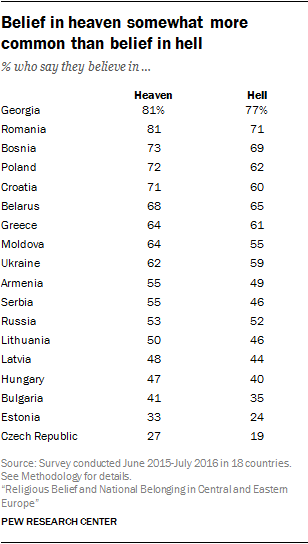Alvecia wrote:My question about worth was more directed in the sense of "what makes a religious belief any different from any other strong held belief", beyond perhaps popularity. The dragon in my garage as an example.
I was born and raised a Catholic, spending my entire primary and secondary education in faith schools, so I like to think I have some basic understanding of what christians believe in.
The dragon in your garage doesn't give you things like the prayer of the Angel of God.
You may not appreaciate things like that prayer, said differently, see its worth, but many people do.
This is the prayer of the Angel of God.
Observed in: catholic church (1,3 billion people, 50% of all christianity)
Latin versionÁngele Dei,
qui custos es mei,
me, tibi commissum
pietáte supérna,
illúmina, custódi,
rege et gubérna.
Amen
Official english versionAngel of God,
my guardian dear,
to whom God’s love commits me here,
ever this day be at my side,
to light and guard, to rule and guide.
Amen.
---
What belief points are expressed in this prayer? (on which belief this prayer is based on?)
-Angels: spiritual beings at the service of god, they are pure and immune to humans weaknesses
-Human weaknesses: to be vulnerable to temptation, to have weak wills
-Every person since birth received an angel as guardian, regardless of personal actions, deeds and misdeeds
-Guardian angels help in hardships, and lead to God
-Christian prayer: "the raising of one's mind and heart to God, or the requesting of good things from God." Prayer may be expressed vocally or mentally.
-Prayers of Intercession: prayers of intercession don't aim directly at god, but at some other being, spiritual or human, to ask them to put in a good word for us in front of god, to ask them to pray god for us
-Heavenly Piety: one of the names of God, used in the latin version to highlight why god acts
---
What are the takeaways from this prayer according to Tradition?
-Every person is precious and important to God, so much to instruct an angel as guardian for everyone
-The aid and blessings offered by god to everyone in the form of a personal guardian angel are:
to light, or illuminate: to don't walk in the dark but in the light, but also to find light in oneself, to light up the intellect and the soul
to guard: to keep safe, to be protected from evil, to be kept safe from temptations and the deception of evil
to rule: this one can mean to support, to hold firm, to hold up, when faced with difficulty or while falling
to guide: to be inspired to make the right choice, and to avoid falling in mistake, to be purposeful and to not be led astray, to be led to god
-the role of the guardian angel is that of a divinely inspired conscience
-like with conscience, the guardian angel always talks and gives good suggestions, but to listen or not, is up to the person
-the presence of a guardian angel reinforces the concept that no one is ever alone
-the prayer of the Angel of God exists not only to call more support, but also to give due respect to their presence, for the work they do, to don't take them for granted
Some pictures the Angel of God
https://en.wikipedia.org/wiki/File:Cort ... gel_01.jpghttps://en.wikipedia.org/wiki/File:Guar ... l_1900.jpghttps://commons.wikimedia.org/wiki/File ... Kindes.jpghttps://pl.wikipedia.org/wiki/Plik:Schutzengelbild_(florentinisch_17Jh).jpghttps://pl.wiktionary.org/wiki/Plik:Ber ... zengel.jpg

